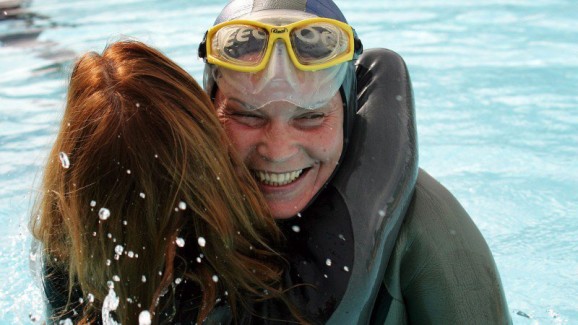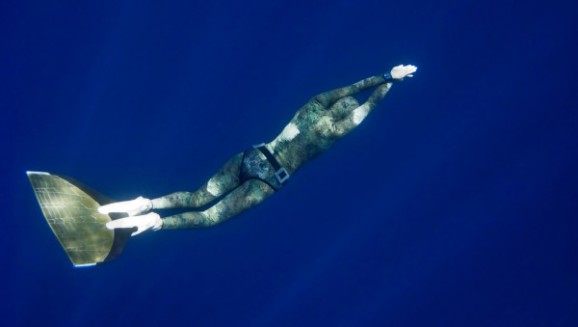The Mysterious Disappearance of Natalia Molchanova

Last September, dressed in a shimmering golden wetsuit, Natalia Molchanova was submerged up to her shoulders in the Mediterranean, two miles off shore of Sardinia, Italy. Her eyes were closed as she focused on controlling her breath. With each extended exhale she lowered her heart rate, preparing to dive down more than 300 feet and back—roughly the height of a 60-story building—on a single breath.
This was the AIDA Team World Championship—the highest-level competition officiated by freediving’s governing body—and Molchanova’s was perhaps the most highly anticipated performance of the day. Dry boats full of spectators and fellow athletes treading water nearby crowded around the then 52-year-old Molchanova as she prepared for her dive. She had 41 world records and 23 world titles, making her the most decorated athlete in the sport’s history, by far.
She arched her back, lifting her shoulders out of the water, inhaled all the oxygen that she could, then placed her face in the water and bowed forward into a duck dive. Her monofin whipped at the surface as she began her descent. At 65 feet, Molchanova disappeared into the thermocline, where a cold upwelling mingled with warm water near the surface. Athletes have compared piercing the boundary to stuffing your head into an ice cooler. Molchanova didn’t even twitch.
Three minutes and 29 seconds after descending, Molchanova reemerged, gripped the competition line, and let out a laugh. The tag she tore from a submerged plate to prove she’d made depth dangled from her finger like a toy ring. It was no wonder that her fellow competitors called her the Queen.
That was the first time I saw Molchanova dive deep, and it is likely the last. I was in Sardinia that day covering the event for a forthcoming book about an American freediver who died in November 2013 during a competition in the Bahamas. So when I heard on Monday that Molchanova had gone missing off the coast of Formentera in Spain during a dive on Sunday I was already aware of the risks inherent in what has become one of the world’s fastest-growing sports. One of the most common is blacking out in shallow water or at the surface, and such incidents claim the lives of roughly 100 freedivers and spear fishermen each year.

The waters two miles west of La Savina at Poiniente de es Freus, where Mochanova dove on Sunday, can be tempestuous. According to her son, Alexey Molchanov, a 28-year-old competitive freediver, there was a raging current at depth that day. Molchanova had been diving competitively for 13 years, and was teaching a private lesson for two dive students when she disappeared on Sunday, Alexey said. The students lost track of her after she descended on a dive to a depth believed to be between 115 and 130 feet. That’s quite a dive, especially without fins, but her personal best in that discipline is a world record 232 feet, and with over 65 feet of visibility, her safety diver should have been able to maintain visual contact. But she didn’t have an experienced diver watching her back during the dive, and somehow became separated from the group.*
Witnesses told Alexey, who was not with her at the time, that the deep current carried his mother away. One diver from nearby Majorca contends that it’s possible that Molchanova could have been carried as far as several hundred meters. As far as her fellow divers know, she never resurfaced. At this point, it’s impossible to know if she was injured at depth, was caught in a ghost net (a stray fishing net difficult to see in deep water), blacked out, or if she is still alive, drifting at sea.
On Wednesday, an underwater search for Molchanova was suspended. A local coast guard patrol was still monitoring the surface, though hope has faded considerably. Alexey didn’t think he’d ever find his mother, dead or alive, and was starting to believe she might stay in the deep blue sea—her favorite place—forever.
Molchanova was a competitive swimmer through college and always loved open water swimming, but she didn’t begin freediving until 2002, at age 40, while coping with a recent divorce. She moved to Moscow to pick up the pieces and she read about freediving in a magazine.
Within a year she’d broken a Russian record in the pool. Competitive freediving includes three pool disciplines: static apnea, in which a diver goes face down in a pool and floats holding her breath as long as possible (Molchanova’s world record is 9:02); dynamic, in which a diver swims as many pool lengths as possible underwater on one breath with a monofin (her record is 777 feet); and dynamic no fins, in which she does the same thing using a breast stroke (her record is 597 feet). But to Molchanova and Alexey, the pool is where you train. The sea is where a freediver is made.
Athletes have compared piercing the boundary to stuffing your head into an ice cooler. Molchanova didn’t even twitch.
Dangers in the ocean abound. At about 65 feet deep, the effects of buoyancy shift and a diver begins to sink like a stone. That helps preserve oxygen on the way down, but when the diver wants to return topside she must kick hard against that negative buoyancy, which is similar to moving through a swift current.
At such depths in the open ocean, a diver must master intricate equalization techniques, withstand the effects of intense barometric pressure as their lungs become compressed to a fraction of their normal size, and cope with narcosis, the effect of excess nitrogen in the blood due to that pressure. The condition can make a diver feel drunk or high, or trigger a stress response that burns precious oxygen molecules. Along the way, a diver’s heart rate drops to half of its resting pulse rate—something that happens to Tibetan monks during deep meditation. Upon reemerging at the surface, by contrast, a diver experiences a rush of adrenaline. It’s one reason people quit jobs, move, and risk their lives for this sport.
A 2004 training dive in the famous blue hole in Dahab, Egypt, cemented Molchanova among the freediving elite. She swam the length of an 82-foot-long underwater arch at more than 170 feet of depth and returned to the surface unscathed. “I have a big experience inside when I go through the arch,” Molchanova told me last year. It led to an epiphany that true power in freediving comes from a deep relaxation that feels like surrender, she said. “Freediving is not only sport, it’s a way to understand who we are. When we go down if we don’t think, we understand we are whole. We are one with world.” The next year, in 2005, Molchanova achieved the world championship with a constant weight dive of 282 feet. She’s been the sport’s dominant performer ever since. A mere 72 hours after American Ashley Chapman broke one of Molchanova’s records with a 206-foot dive in the Cayman Islands in 2012, Molchanova dove to 216 feet to reclaim the record.
That was Molchanova’s 50th birthday. Ever since, Molchanova has made a habit of breaking world records on her birthday as a means of inspiring older athletes everywhere. “Many people, when they reach 50, they think life is over,” she told me. “I want to show them, there is more they can do.” In 2013, at age 51, Molchanova broke six freediving world records. This year, she extended her no fins record on her 53rd birthday, won two golds at the AIDA World Individual Pool championship in Belgrade in June, and was training to compete in the AIDA Individual Depth World Championship in Cyprus in September. It was a good bet she would sweep gold.
Molchanova was far more than a tremendous athlete. She lectured at a Moscow university and was involved in research into the intricacies of freediving physiology. She and Alexey, who she coached and who holds the record for deepest dive among men in the history of the sport, own their own freediving apparel company. They manage a stable of over 60 teachers who turn out hundreds of new certified freedivers every month using Molchanova’s curriculum. They’ve run training camps and competed all over the world.
The last time I saw Molchanova in the water, at a pool in Sardinia, her Russian team was trailing Japan by a mere 98 feet with a gold medal on the line. All she needed to do was swim one length and a bit more, and the Russian women would win. With a rapt crowd of over 100 spectators looking on, she swam that length, then another, then several more. She surfaced after a 777-foot dynamic swim and broke her own world record. The crowd cheered for minutes on end. Through it all, she smiled and waved, beaming, as the photographers called her name.
